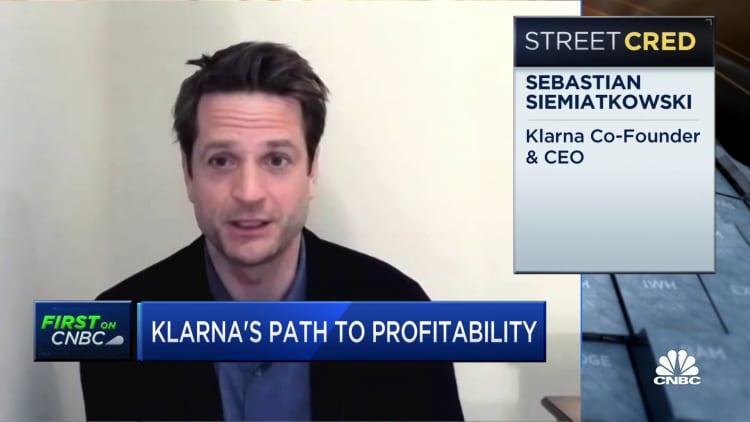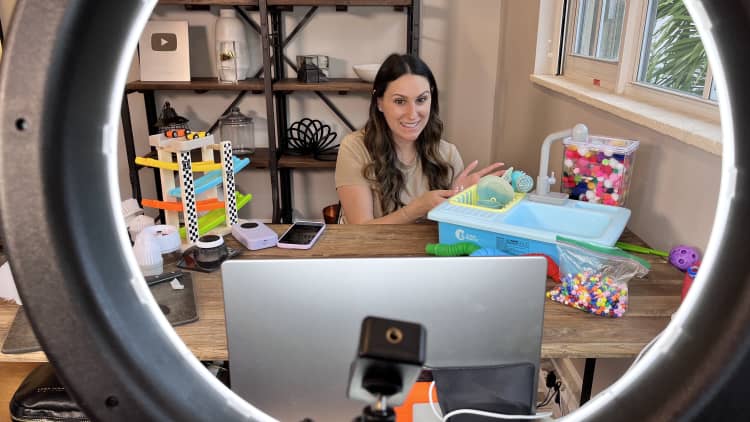Klarna announced a sweeping redesign of its app, adding a TikTok-inspired discovery feed powered by artificial intelligence, customized shops for social media content creators, and the ability to sell secondhand goods.
The Swedish "buy now, pay later" pioneer said Tuesday that its new design would help users find the items they want by using more advanced AI recommendation algorithms, while merchants will be able to target customers more effectively.
The AI will build a personal profile of shoppers based on their shopping behavior and which brands they like. They'll then be shown recommendations from Klarna's network of 500,000 retailers, which includes Nike, H&M and Instacart. Klarna counts over 150 million users globally — including users accessing its online checkout tools via retailers.
According to David Sandstrom, Klarna's chief marketing officer, the firm took inspiration from Chinese tech platforms, which he said have mastered the art of algorithm driven-shopping.
"In China, a couple of years ago, 90% of transactions started with a search," Sandstrom said. "Nowadays, less than 50% of purchases start with a search because recommendations are so tailored to them."
"Our ambition is to basically offer people products and brands before they knew they wanted them," he added.
TikTok, in particular, has become the envy of major online platforms, thanks to its advanced targeting. The company has been rapidly growing its e-commerce business, which handled a reported $1 billion in sales in the first quarter, according to The Information.
Still, Sandstrom admits Klarna's technology is nowhere near as sophisticated as TikTok's — but he's confident the company can get to that level one day.
"It would be naïve to compare us to TikTok's recommendation engine. It would be a blatant lie to say we're close to that," he said. "But we have the prerequisites to do that."
Klarna joins a host of other tech firms which have been loading their services with AI software to better tailor content to users as the surge in popularity for OpenAI's ChatGPT drove up hype for the technology.

Music streaming platform Spotify recently rolled out an AI-powered DJ that selects songs based on a person's listening habits, for example.
Klarna itself previously launched the ability to integrate ChatGPT into its service with a plugin that lets users ask the popular AI chatbot for shopping inspiration.
But Klarna isn't relying on AI alone to personalize its service to users. The app also launched an "Ask Klarna" feature Tuesday which lets shoppers chat with or video call human customer advice specialists.
Among the other features Klarna is rolling out is a resale option that lets people sell used clothing, electronics and other items through a partner platform. Klarna declined to disclose the partner for its resale service.
In its home market of Sweden, Klarna already offers the ability to sell secondhand goods through a partnership with resale marketplace Tradera.
Resale platforms like Depop and Vinted have grown more popular in recent years, thanks in part to Gen Z's embracing of the circular economy, which promotes sustainability by reducing waste through reuse and recycling.
Targeting monthly profitability in summer
Klarna is also launching a tool that lets content creators set up their own storefronts to promote items from brands they've struck affiliate deals with. The service, called "Creator Shop," launches in the U.S. soon.
It also launching a self-service tool for advertisers, called "Ads Manager," that lets marketers track paid product listings they've taken out in Klarna's app. Of late, Klarna has sought to diversify into advertising to reduce its dependence on fees from merchants. Marketing makes up 10% of Klarna's overall revenue, having jumped 131% in 2022 from a year ago.

Klarna is one of a slew of buy now, pay later firms that let people split the cost of their purchases over a period of monthly installments, interest-free. The firm makes its income by charging a small fee on each transaction for retailers offering its payment method.
The company is hoping to turn its fortunes around after a brutal year in which it cut its valuation by 85% to $6.7 billion, laid off over 10% of its workforce, and reported a $1 billion loss.
Sandstrom said he expects Klarna will reach profitability on a monthly basis by the summer, echoing messaging from CEO Sebastian Siemiatkowski late last year.
"The growth we're seeing now is sustainable," he said. "Going forward, I think AI is going to play a big role in the efficiency gains we're seeing."
He added that Klarna is hiring for engineers to drive its AI efforts — but that the "profile of people we're looking for has changed quite dramatically in the last couple of months."
"What a single extremely talented engineer can achieve versus what we used to need an entire team for is massive," Sandstrom said.
Klarna and other buy now, pay later products proved popular during the onset of the Covid-19 pandemic. Online shopping became more prevalent as in-person spending opportunities were restricted.
However, as the war in Ukraine stoked global inflation and sparked fears of a recession, central banks around the world raised interest rates, shaking investor sentiment around buy now, pay later platforms offering zero-interest credit.
Meanwhile, buy now, pay later has come under scrutiny from regulators because of fears that it is pushing some consumers, particularly younger people, into arrears. In the U.K., the government has proposed new rules aimed at adding some friction to the process of applying for a buy now, pay later loan.
WATCH: Bitcoin at $10,000 — or $250,000? Investors are sharply divided on 2023



